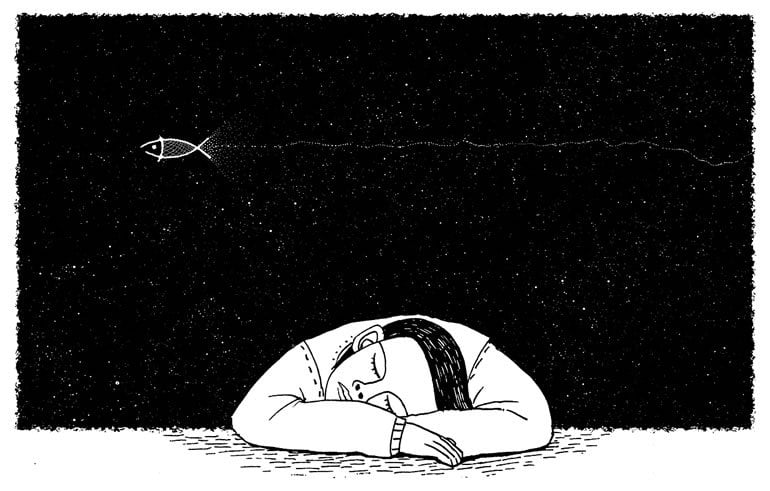Summary: Atheists and agnostics are less likely to experience sleep problems than those who have religious faith. 73% of atheists and agnostics report getting more than seven hours of nightly sleep, compared to 63% of Catholics and 55% of baptists. Atheists also report experiencing fewer difficulties in falling asleep.
Source: AASM
A new study of sleep, religious affiliation, and perceptions of heaven found that atheists and agnostics are significantly more likely to be better sleepers than Catholics and Baptists.
Preliminary results show that 73% of atheists and agnostics reported getting seven or more hours of nightly sleep, which is recommended by the American Academy of Sleep Medicine to promote optimal health. In contrast, 63% of Catholics and only 55% of Baptists reported sleeping at least seven hours per night. Atheists and agnostics also reported experiencing less difficulty falling asleep.
“Mental health is increasingly discussed in church settings — as it should be — but sleep health is not discussed,” said lead author Kyla Fergason, a student at Baylor University in Waco, Texas. “Yet we know that sleep loss undercuts many human abilities that are considered to be core values of the church: being a positive member of a social community, expressing love and compassion rather than anger or judgment, and displaying integrity in moral reasoning and behavior. Could getting better sleep help some people grow in their faith or become better Christians? We don’t know the answer to that question yet, but we do know that mental, physical and cognitive health are intertwined with sleep health in the general population.”

The study involved a population-based sample of 1,501 participants in the Baylor Religion Survey, which includes questions on religious affiliation, behaviors, and perceptions. Participants also rated their difficulty falling asleep and their average total sleep time.
Results also show that those participants who reported sleeping seven or more hours per night were significantly more likely to believe that they would get into heaven. However, these perceptions of heaven were unrelated to difficulty falling asleep at night. According to the authors, this pattern indicates that better sleep leads to a more optimistic outlook, which in this case is manifesting as positive expectations of getting into heaven.
The research abstract was published recently in an online supplement of the journal Sleep and will be presented as a poster Aug. 28-30 during Virtual SLEEP 2020. SLEEP is the annual meeting of the Associated Professional Sleep Societies, a joint venture of the American Academy of Sleep Medicine and the Sleep Research Society.
Funding: The Baylor Religion Survey was supported by the John Templeton Foundation.
About this sleep research article
Source:
AASM
Contacts:
Corinne Lederhouse – AASM
Image Source:
The image is in the public domain.
Original Research: Closed access
“Sleep Health Across Religions: A Consideration of Bidirectional Processes” by K Fergason, W Rowatt, M K Scullin. Sleep.
Abstract
Sleep Health Across Religions: A Consideration of Bidirectional Processes
Introduction
The psychology of religion literature indicates that religious engagement is beneficial to physical and mental health. Such effects might be mediated by sleep health, which causally affects mood, cognitive, and immune functioning. However, few studies have investigated whether religiosity is associated with better sleep, and no studies have considered the reverse causal direction: better sleep may impact religious behaviors or perceptions.
Methods
We conducted a secondary data analysis of 1,501 participants in Wave 5 of the Baylor Religion Survey (BRS-5). Completed in Spring 2017, the BRS-5 used Address Based Sample methodology to derive a population-based sample. The survey included questions on religious affiliation, behaviors, and perceptions (e.g., certainty of Heaven). Additionally, participants rated their difficulty falling asleep and their average total sleep time. We investigated whether participants were meeting AASM/SRS consensus guidelines of 7–9 hours/night.
Results
Religious affiliation was associated with sleep duration, but not in the predicted direction. Atheists/Agnostics (73%) were significantly more likely to report meeting consensus sleep duration guidelines than religiously-affiliated individuals (65%), p<.05. For example, Atheists/Agnostics reported better sleep duration than Catholics (63%, p<.01) and Baptists (55%, p<.001). Atheists/Agnostics also reported less difficulty falling asleep at night than Catholics (p=.02) and Baptists (p<.001). The effects persisted when controlling for age and were particularly evident in members of African American congregations. Perceptions of getting into Heaven were significantly higher in participants who obtained better sleep duration, p<.05, but interestingly, such beliefs/perceptions were unrelated to difficulty falling asleep at night, suggesting that better sleep may lead to these perceptions rather than vice versa.
Conclusion
In contrast to predictions, religious affiliation was associated with significantly poorer sleep health. Poor sleep health has implications for physical and mental health, and seemingly also religious perceptions/beliefs. Future experimental work is required to disentangle the causal direction of sleep-religiosity associations.
Support
The Baylor Religion Survey was supported by the John Templeton Foundation.






